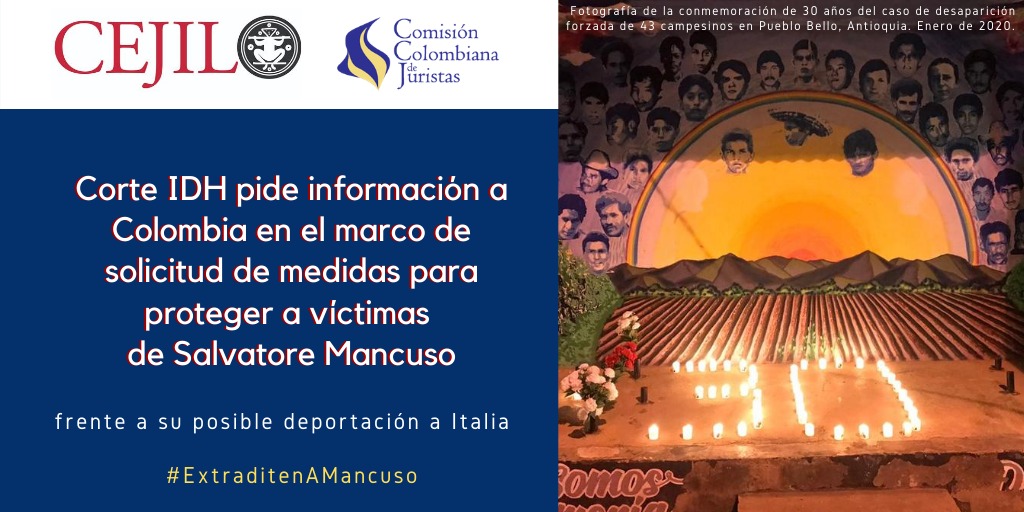






Bogotá and Washington, D.C. August 25, 2020.- The Colombian government will need to respond to an information request made by the Inter-American Court of Human Rights (I-A Court) yesterday with regards to an urgent petition for protection measures filed on behalf of the victims of three cases of serious human rights violations committed by members of the United Self-Defense Forces of Colombia (AUC) under the leadership of former paramilitary Salvatore Mancuso, who is scheduled for possible deportation from the United States to Italy in the coming days.
The request for protection measures was filed before the Inter-American Court -the top regional human rights tribunal- on August 21, 2020 by the Colombian Commission of Jurists (CCJ) and the Center for Justice and International Law (CEJIL) as reports of Mancuso’s likely deportation to Italy, country from which he is also a citizen, heightened. The motion asks that the Colombian government ensure the extradition process from the United States to Colombia is executed in a timely matter and under international law in order to ensure access to justice for the victims of the massacres of Ituango (2002), Pueblo Bello (1990), and Valle Jaramillo (1998); and urges the Colombian government to abstain from carrying out any activities that would obstruct the extradition process.
It is worth noting that in previous judgements, the Inter-American Court analyzed and proved the connection between State agents and paramilitary groups, specifically the AUC, as well as their responsibility for serious human rights violations. These decisions also ordered Colombia to investigate, judge, and punish those responsible.
Mancuso was extradited from Colombia to the U.S. in May 2008 during the presidency of Álvaro Uribe Vélez. In July 2020, Mancuso completed his sentence for drug trafficking. Currently, his legal status in the U.S. is in question and he may be deported to Italy. So far, Colombia has filed three extradition for Mancuso. All of them have been rejected due to clerical errors or withdrawn by the Colombian government altogether. This points to troubling pattern of negligence which could result in Salvatore Mancuso side-stepping any sort of punishment from the decision already made by the Colombian legal system for his role in human rights violations.
“The Colombian government has an obligation to investigate, try and sanction those responsible for the grave human rights violations connected to the massacres of Pueblo Bello, Ituango and others. This obligation includes processing extradition requests in a diligent and timely fashion so that the truth of what happened is known and serious crimes do not hide in impunity,” stated Viviana Krsticevic, Executive Director of CEJIL.
“The deportation of Salvatore Mancuso to Italy would seriously affect the rights to truth and justice of the victims and would result in a guarantee of impunity,” said Gustavo Gallón, director of the Colombian Commission of Jurists.
At the request by the Inter-American Court, the Colombian government will have until August 31 to send information about this situation, after which the Court will determine whether to grant the measures.